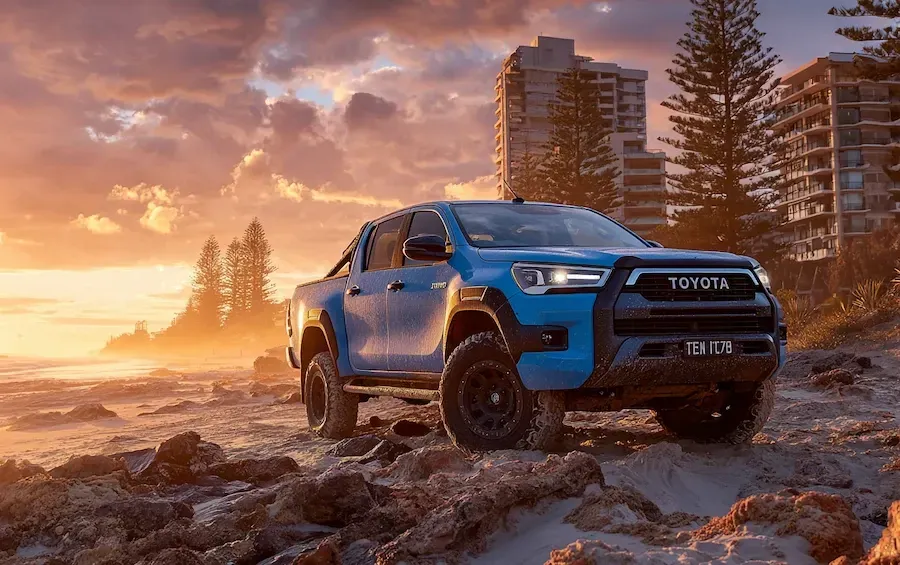Should You Rent or Buy Your Next Four-Wheel Drive (4WD)?

Getting a new vehicle can be a tantalising thought, especially if the car in question has as much utility and versatility as a four-wheel drive.
That said, with great power comes great responsibility. There are a ton of perks that a standard 4WD can offer that other vehicles don’t, but this begs the question: Is it better to rent one for its intended purpose or to buy and register one under your name?
The truth there isn’t an answer that applies to all cases. Some may find renting optimal, whether you're
renting a car overseas or here in Australia, whereas others would be better off owning one outright. That said, knowing which camp you end up pitching your tent under can be a long journey in itself.
If you’re struggling to figure out whether to rent or buy your next 4WD, then you’re in the right place. We’ll break down the pros, cons, and other considerations you should make before making your decision.
What is a 4WD?
Before diving into the pros and cons of each purchasing option, it’s vital to familiarise yourself with what is classified as a 4WD before considering a four-wheel drive rental with Redspot or purchasing a brand new set of wheels.
Essentially, a standard 4WD is a type of drivetrain system that powers four wheels at once with the driver’s input. Think pickup trucks, utility vehicles, SUVs, and work vehicles. This is unlike an all-wheel drive or two-wheel drive, as the former automatically powers wheels without driver input, whereas the latter is powered on one of two wheelsets, either at the front or the rear.
This multi-powered system enables the vehicle to navigate through different types of terrain and push through various steepness levels with good grip and control. This makes this vehicle type a hit when off-roading or driving through harsh weather and unpaved environments.
Because of its traction-focused design, a 4WD is especially suited for situations where power needs to be evenly distributed to prevent slippage. For instance, you can normally see 4WDs used in situations where the roads are icy, snowy, rocky, or muddy.
It’s no city car, but it’s a good choice for drivers who intend to hit rough, country roads or for people who may need to navigate unpredictable terrain across the backcountry.
3 Pros of Buying a 4WD
Here are the benefits of purchasing a 4WD system for your personal needs.
1. It’s Yours to Keep
Owning a 4WD under your name means that you hold complete ownership rights of the vehicle, full stop. This level of control gives you access to use your vehicle however you wish without any repercussions.
Wish to upgrade the tyres or add roof racks? You’re free to do so without needing to ask permission. Run out of money and need to liquidate assets? You’re free to use the 4WD as a potential item to sell.
Even if you don’t intend to use a 4WD all year long, who knows what the next few months or years will bring you. You may need a 4WD to navigate rocky roads in the countryside in the next few years. And if that happens to be the case, you have a trusty sidekick in the form of a 4WD vehicle ready to get back on gear.
In any case, owning a 4WD means that you can use it however you want, whenever you want. This degree of ownership can be both a good and a bad thing, but unless you drive recklessly or fail to responsibly keep up with your vehicle’s maintenance needs, then this free level of ownership is almost always a perk.
2. Availability is Not an Issue
When the car lease ends and you have no cash flow to keep leasing the 4WD, you’ll have to make the painful but legally essential decision to return the vehicle to its rightful owner.
But this is a non-issue if you own the vehicle. It’s available 24/7.
You don’t need to contact a store representative from the car dealership to request permission to use the vehicle. You don’t have to worry about other clients calling dibs on the specific 4WD that you want. You don’t have to share your vehicle with other people, either. It’s yours, period.
When you don’t have a set schedule on when it’s time to give your 4WD a whirl, owning it ensures that you’ll never have to worry about it being unused. Plus, if you don’t foresee using it in the next few months, you can always consider renting it out for some quick cash in the meantime.
3. Customisation Freedom
Some rental companies prohibit clients from modifying their 4WDs. This isn’t the case if you own the vehicle.
You’re free to customise the 4WD however you wish, whether it’s by adding some dashboard upgrades, giving it a custom paint job, or installing a snorkel. You can also remove these additions as you see fit—the only restriction is your budget and imagination here.
Another advantage of owning a 4WD is its resale value.
A 4WD is an asset, and it
can be liquidated whenever you deem it the right time. While it can depreciate over the years, it has decent secondhand appeal and can still retain a high price even after years of use.
3 Cons of Buying a 4WD
Here are some drawbacks to consider before committing to a 4WD purchase.
1. High Purchase Price
If you lack the capital to finance a 4WD or if you have a poor credit score, then you may be priced out of buying this vehicle for now.
This vehicle also tends to be more expensive than standard 2WDs like sedans due to its off-road capabilities.
2. You’ll Maintain It Yourself
By owning a 4WD, you are responsible for fixing and maintaining the vehicle over time.
This means that if you encounter a flat or if a specific mechanism starts to sputter out or fail, then you have to shoulder the cost of bringing it to a maintenance shop or fixing it yourself. No rental company will give you handouts on how to fix it.
3.
Low Flexibility of Unit Type
Unless you have a large budget, you’re likely limited to trying out your chosen model. You may be stuck with it for however long you wish to own it, which can be for years.
This can limit your ability to future-proof your operations, which can be somewhat restrictive as car brands adopt more tech in their 4WD models.
3 Pros of Renting a 4WD
Here’s why renting a 4WD might suit your travel or short-term needs.
1. Access to Newer Models
By renting, you don’t have to worry about excessive down payments or high debt obligations. This allows you to spend less for more features, at least in the short term.
You may be lucky enough to test out newer models with better safety features and fuel efficiency, enabling you to use a 4WD to its highest utility.
2. Ideal for One-Off or Seasonal Use
If you need a 4WD for only a specific purpose, like a road trip in the mountains or a relocation job to the backcountry, then leasing is the best choice.
This frees up your capital while granting you all the benefits of a standard 4WD vehicle. This is especially useful for businesses that may only need this type of vehicle on a seasonal occasion.
3.
You Don’t Have to Maintain It
Since you’re leasing the vehicle, you don’t hold responsibility for it for long-term upkeep. Rental companies are the ones ensuring that the vehicle is serviceable, particularly if they’re advertising it.
That said, you still need to ensure that the rental car comes back in one piece. You are responsible for shouldering the costs if the vehicle gets damaged under your care, particularly if you haven’t paid for insurance for it.
2 Cons of Renting a 4WD
Keep these limitations in mind if you’re thinking of renting instead of owning.
1. Daily Expense is Still an Expense
While you avoid a large purchase price by renting a 4WD, rental costs can accumulate quickly. And you can never resell the vehicle as it’s perpetually an expense. You will also have to pay extra costs, like insurance or a complete fuel top-up.
These fees may end up costing more than buying a 4WD if you’re using it frequently. This makes it a less economical choice for long-term needs.
2. Usage Restrictions
Rental contracts often include limitations on mileage, off-road driving, or use in remote areas.
These restrictions can be inconvenient for those who want the full freedom and capability of a 4WD.
So now that you’ve seen both sides, we hope this guide has helped you weigh the pros and cons clearly. All the best in making your decision!

